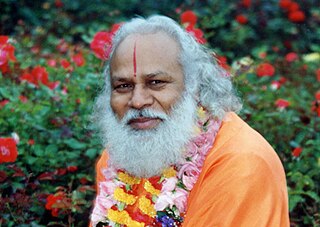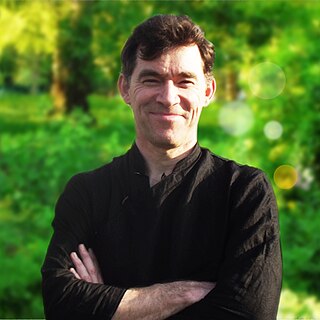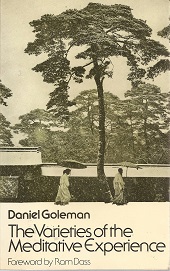
Meditation is a practice of mindfulness, or focusing the mind on a particular object, thought, or activity to train attention and awareness, and achieve a mentally clear and emotionally calm and stable state.
The relationship between Buddhism and science is a subject of contemporary discussion and debate among Buddhists, scientists, and scholars of Buddhism. Historically, Buddhism encompasses many types of beliefs, traditions and practices, so it is difficult to assert any single "Buddhism" in relation to science. Similarly, the issue of what "science" refers to remains a subject of debate, and there is no single view on this issue. Those who compare science with Buddhism may use "science" to refer to "a method of sober and rational investigation" or may refer to specific scientific theories, methods or technologies.
The following outline is provided as an overview of and topical guide to spirituality:

Samuel Benjamin Harris is an American philosopher, neuroscientist, author, and podcast host. His work touches on a range of topics, including rationality, religion, ethics, free will, neuroscience, meditation, psychedelics, philosophy of mind, politics, terrorism, and artificial intelligence. Harris came to prominence for his criticism of religion, and is known as one of the "Four Horsemen" of New Atheism, along with Richard Dawkins, Christopher Hitchens, and Daniel Dennett.
Ego death is a "complete loss of subjective self-identity". The term is used in various intertwined contexts, with related meanings. Jungian psychology uses the synonymous term psychic death, referring to a fundamental transformation of the psyche. In death and rebirth mythology, ego death is a phase of self-surrender and transition, as described by Joseph Campbell in his research on the mythology of the Hero's Journey. It is a recurrent theme in world mythology and is also used as a metaphor in some strands of contemporary western thinking.
Secular spirituality is the adherence to a spiritual philosophy without adherence to a religion. Secular spirituality emphasizes the inner peace of the individual, rather than a relationship with the divine. Secular spirituality is made up of the search for meaning outside of a religious institution; it considers one's relationship with the self, others, nature, and whatever else one considers to be the ultimate. Often, the goal of secular spirituality is living happily and/or helping others.

Buddhism includes an analysis of human psychology, emotion, cognition, behavior and motivation along with therapeutic practices. Buddhist psychology is embedded within the greater Buddhist ethical and philosophical system, and its psychological terminology is colored by ethical overtones. Buddhist psychology has two therapeutic goals: the healthy and virtuous life of a householder and the ultimate goal of nirvana, the total cessation of dissatisfaction and suffering (dukkha).

Spiritual naturalism, or naturalistic spirituality combines a naturalist philosophy with spirituality. Spiritual naturalism may have first been proposed by Joris-Karl Huysmans in 1895 in his book En Route.
Coming into prominence as a writer during the 1870s, Huysmans quickly established himself among a rising group of writers, the so-called Naturalist school, of whom Émile Zola was the acknowledged head...With Là-bas (1891), a novel which reflected the aesthetics of the spiritualist revival and the contemporary interest in the occult, Huysmans formulated for the first time an aesthetic theory which sought to synthesize the mundane and the transcendent: "spiritual Naturalism".
Clark Strand is an American author and lecturer on spirituality and religion. A former Zen Buddhist monk, he was the first Senior Editor of Tricycle: The Buddhist Review. He left that position in 1996 and moved to Woodstock, NY, US to write and teach full-time.
Evan Thompson is a professor of philosophy at the University of British Columbia. He writes about cognitive science, phenomenology, philosophy of mind, and cross-cultural philosophy, especially Buddhist philosophy in dialogue with Western philosophy of mind and cognitive science.

Prakashanand Saraswati or Swamiji is a convicted child molester and Hindu monk from Ayodhya, India. Previously, he founded the Hindu new religious movement "International Society of Divine Love" and Radha Madhav Dham temple in the United States. In 2011, a jury found Swami Prakashanand Saraswati guilty on 20 counts of indecency with a child. He is still a fugitive and appeared on the Fox TV show America's Most Wanted.
Secular Buddhism—sometimes also referred to as agnostic Buddhism, Buddhist agnosticism, ignostic Buddhism, atheistic Buddhism, pragmatic Buddhism, Buddhist atheism, or Buddhist secularism—is a broad term for a form of Buddhism based on humanist, skeptical, and agnostic values, valuing pragmatism and (often) naturalism, eschewing beliefs in the supernatural or paranormal. It can be described as the embrace of Buddhist rituals and philosophy for their secular benefits by people who are atheist or agnostic.

Steve Taylor is an English author and lecturer/researcher in psychology, who has written many books on psychology and spirituality, as well as books of poetry. He is a senior lecturer in psychology at Leeds Beckett University and has been the chair of the Transpersonal Psychology Section of the British Psychological Society.

The Varieties of the Meditative Experience is a 1977 book by American psychologist Daniel Goleman. It was republished under the title The Meditative Mind in 1988.
Dreams have been interpreted in many different ways from being a source of power to the capability of understanding and communicating with the dead. Traditional forms of societies considered dreams as portals to another world, a spirit world. These societies would even say they could gain most of their religious ideas from dreams. They could identify the sacred and gain access to sacred realms or portals to the supernatural. Psychologists have been researching dreams as of the 21st century because the connection between religious connotations in dreams has brought about growth and health. However, many different psychologists claim there is very little evidence to the research on the psychology of religion and dreams.

Zen and the Art of Consciousness (2011), originally titled Ten Zen Questions (2009), is a book by Susan Blackmore. It describes her thoughts during zazen retreats and other self-directed meditative exercises, and how those thoughts relate to the neuroscience of consciousness. Most chapters in the book center around a Zen question and describe Blackmore's inner monologue contemplating the question's implications for subjective experience. The final chapter features a response by Blackmore's Zen teacher.
Han Frederik de Wit is a research psychologist at the University of Amsterdam in 1974. He moved to expanded outside the formal psychology field in search for guidance in his spirituality. De Wit became internationally acknowledged as one of the founders of Contemplative Psychology. Today he teaches meditation at the Shambhala centers in the Netherlands and instructs seminars in the psychology of Buddhism.

Why Buddhism is True: The Science and Philosophy of Meditation and Enlightenment is a 2017 book by Robert Wright. As of August 2017, the book had peaked at The New York Times No. 4 bestseller in hardcover nonfiction.

Altered Traits: Science Reveals How Meditation Changes Your Mind, Brain, and Body, published in Great Britain as 'The Science of Meditation: How to Change Your Brain, Mind and Body', is a 2017 book by science journalist Daniel Goleman and neuroscientist Richard Davidson. The book discusses research on meditation. For the book, the authors conducted a literature review of over 6,000 scientific studies on meditation, and selected the 60 that they believed met the highest methodological standards.
Annaka Harris is an American writer. Her work touches on neuroscience, meditation, philosophy of mind and consciousness. She is the author of the New York Times bestsellerConscious: A Brief Guide to the Fundamental Mystery of the Mind (2019) and the children's book I Wonder (2013).










